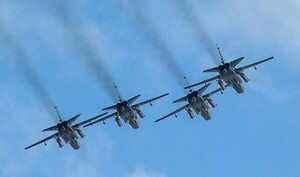
Oleksiy Volovych
Part 1
In the spring of 2011, when in some Arab countries, there were massive demonstrations and uprisings, which were called “revolutions” and “Arab Spring”, many Western countries felt euphoria over the Western-style democracy's “triumphant march” in the Middle East. But instead of democracy, the “revolutions” led to strengthening of radical Islam, separatism and civil wars, and then to a sudden appearance of the “denizen of hell” — a terrorist organization “Islamic State of Iraq and the Levant” (ISIS), which has gone beyond Syria and covered the rich in oil deposits northern Iraq, Yemen and Libya.
Today the ISIS is fighting against all: against the ruling regimes in Syria and Baghdad against Turkey, Iran, and “the Syrian moderate opposition”, against the international Coalition led by the United States, and against the Russian military presence in Syria. The ISIS' combat units consist of mercenaries and fighters from many Arab, Muslim, and even European countries, including Russia. As Putin himself acknowledged, there are about 4 thousand natives of Russia in the ranks of the IS.
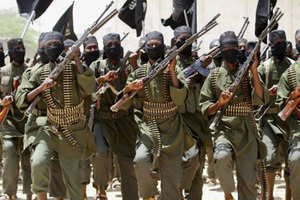 In fact, the ISIS is opposed to the whole civilized world, and Syria and Iraq are the springboard of its expansion in the whole Middle East and even beyond. Russian media spreads many publications in which the authors argue that the USA itself helped form not only the Syrian anti-B. Assad opposition, but the terrorist group ISIS, which later slipped out of the West's control. At this, Russians state that a similar precedent in the 1980s took place in Afghanistan.
In fact, the ISIS is opposed to the whole civilized world, and Syria and Iraq are the springboard of its expansion in the whole Middle East and even beyond. Russian media spreads many publications in which the authors argue that the USA itself helped form not only the Syrian anti-B. Assad opposition, but the terrorist group ISIS, which later slipped out of the West's control. At this, Russians state that a similar precedent in the 1980s took place in Afghanistan.
As is known, the Coalition headed by the United States supports the so-called “moderate Syrian opposition,” while Russia and Iran support the current Syrian government, or rather what's left of it, headed by President B. Assad. For this reason, Putin's proposal (on which he spoke on September 28 from the rostrum of the UN General Assembly) to establish a broad coalition against the ISIS, including Russia, has not been heard by US President Barack Obama and other Western leaders. At this, in Washington and in European capitals it is often said that B. al-Assad has lost his legitimacy. But this sounds somewhat doubtful to us, because legitimacy of this or that leader (in this case it's B. Assad) is decided upon by the people in the course of free act and deed, and not by the leaders of other countries.
We should admit that V. Putin skillfully took advantage of the unauthorized by the UN actions of the United States and the West, Turkey and some Arab countries, particularly Saudi Arabia and Qatar, providing financial and military support to the “moderate Syrian opposition.” However, it should be noted that the situation around Syria, where the Russian Federation and the USA hold diametrically opposite positions, to obtain a coherent and mutually acceptable UN Security Council's resolution is actually impossible. Thus, October 4, 2011 and February 4, 2012 Russia and China vetoed the UN Security Council's resolution condemning the regime of B. Assad and containing a number of strict demands to him, while the demands to the Syrian opposition, according to the Russian side, were far less strict.
The motives of V. Putin's Syrian campaign, or rather, his adventure, can be divided into political, informational, military and economic. After the “victorious march of the Russian world” came to a standstill, having faced with the Ukrainian national resistance, V. Putin needed an effective maneuver to save “Lugandonia”, to break out of isolation and sanctions and at this to raise his rating among Russians. The Kremlin decided to chose as this maneuver the fight against terrorism in the Middle East in general and in Syria in particular, because the problem has become quite tangible for the European countries, especially after increasing of the flow of refugees from Syria and Iraq to Europe, which according to some analysts happened not without the Russian special services.
Many observers also believe that Russian special services were involved also in acts of terrorism on 13 November in Paris. For example, November 19, political scientist S. Belkovskiy on the Ekho Moskvy radio station said that President V. Putin had known about imminent terrorist attacks in Paris, thanks to his numerous agents in the ranks of the IS. The expert publicly accused Russia of involvement in the terrorist attacks on November 13 in Paris. S. Belkovskiy believes that being aware of the impending tragedy, Putin deliberately refused to take countermeasures and did not share the relevant information with Paris.
Trying to Ease the Isolation
In the opinion of experts of “Borysfen Intel”, the Kremlin's decision about bringing a few squadrons of Russian attack aviation and bombers to Syria and the beginning of bombing of the ISIS forces and the Syrian opposition, in addition to military purposes has first of all a political goal — to ease the international isolation of Russia after the annexation and occupation of the Crimea and a part of the Donbas.
After the invasion of hundreds of thousands of Syrian refugees onto the territory of European countries, the international community has realized firsthand all the negative consequences of the Syrian crisis and terrorist activities of the ISIS. Here V. Putin decided to help the Europeans to “get rid of this nightmare”, sending units of the RF Aerospace Forces to Syria to make air strikes on the Islamic State's positions.
During a meeting with US President Barack Obama on the sidelines of the UN General Assembly on September 28, V. Putin tried to talk him into creating a new coalition against the IS led by the US and Russia. Had V. Putin managed to do it, it would mean the beginning of Russia's getting rid of isolation. After all, the two great powers “in the spirit of the anti-Hitler coalition” together save not only the Middle East, but also almost the whole world from the threat of Islamist terrorism international of the unprecedented scale. But Putin failed, and already September 30, Russia began to carry out its military operations in Syria on its own.
How could Obama agree to V. Putin's proposal to cooperate in the fight against terrorism if on the same day in his speech from the rostrum of the General Assembly, he accused Russia of “annexation of the Crimea and aggression in the East of Ukraine?” The following day, President P. Poroshenko in his speech asked the Kremlin not a rhetorical question: “How can you call for the fight against terrorism, if you are supporting terrorism directly at your door?” And the whole world did hear this.
The second attempt to talk President B. Obama into creating a new coalition under the auspices of the United States and the Russian Federation was made by V. Putin on 15 November during a half-hour informal conversation with B. Obama on the sidelines of G-20 summit in Antalya, Turkey. However, this attempt seems to have failed too. We can only talk about coordination and cooperation at the tactical level. In early October, during the negotiations it was agreed to hold direct contacts between the military of the two countries in order to avoid possible collisions during the USA's and Russia' future military operations in Syria.
The Kremlin's decision on the deployment of Russian troops on the territory of Syria was officially explained by the intention of the Russian Federation to take part in the struggle against the IS, in which aviation units of United States, Britain and France have been participating for a year, with mainly moral support of dozens of countries participating in the anti-terrorist coalition.
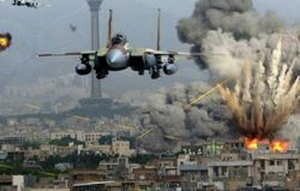 But, as shown by further actions of the Russian aviation, apart from attacking objects of the ISIS, Russians bombed positions of the “moderate Syrian opposition” to assist the Syrian government troops in the liberation of the settlements captured by the opposition near Aleppo in the north of the country, which caused outrage of the countries-members of the above-mentioned Coalition
But, as shown by further actions of the Russian aviation, apart from attacking objects of the ISIS, Russians bombed positions of the “moderate Syrian opposition” to assist the Syrian government troops in the liberation of the settlements captured by the opposition near Aleppo in the north of the country, which caused outrage of the countries-members of the above-mentioned Coalition
To all this, we should remind that on 19 November, Russia's military operations in Syria were declared illegitimate by the international community. On that day, the Human Rights Committee of the UN General Assembly, members of which are 193 States, adopted the draft Resolution submitted by Saudi Arabia, which condemns the Russian-Iranian invasion of Syria. The Resolution was approved by 115 UN member states, 51 countries “abstained”, 15 members of the Organization voted “against”. In fact, the majority of UN member states condemned Moscow for the special operation in the Middle East. Thus, V. Putin's adventure in Syria has not weakened the international isolation of Russia, but even made it worse.
“Novosyriya” (“New Syria”) Instead of “Novorossia” (“New Russia”)?
As President P. Poroshenko has pointed out, V. Putin, having failed to create “Novorossia” in the East of Ukraine, will try to create “Novosyria” to “return to the great politics through the back door”. Indeed, the project of “Novorossia”, which was being carried out under the direction of the Kremlin, the FSB and the GRU of Russia, from Kharkiv to Odesa, including Dnipropetrovsk, Zaporizhzhia, Kherson and Mykolaiv regions, failed. According to researches by sociologists of the Virginia Tech University and the University of Colorado, the vast majority of the population of these areas did not support the project “Novorossia”. As a result, “Novorossia” shrank to the size of the so-called “Luhandonia”.
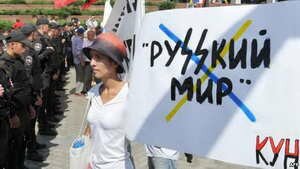 The Kremlin's relying on the Russian-speaking population did not work. Being Russian-speaking does not mean having pro-Russian or pro-Putin sentiments. Most of the Russian-speaking citizens of Ukraine are patriots of their country, and not supporters of the notorious idea of the “Russian world”, and this fact unpleasantly surprised the Kremlin. The Russian language is not just the language of Putin, Dugin and Zhirinovskiy. It is also the language of L. Tolstoy, N. Gogol, N. Nekrasov, F. Dostoyevskiy, A. Sakharov, B. Nemtsov, and many other truly great people of Russia.
The Kremlin's relying on the Russian-speaking population did not work. Being Russian-speaking does not mean having pro-Russian or pro-Putin sentiments. Most of the Russian-speaking citizens of Ukraine are patriots of their country, and not supporters of the notorious idea of the “Russian world”, and this fact unpleasantly surprised the Kremlin. The Russian language is not just the language of Putin, Dugin and Zhirinovskiy. It is also the language of L. Tolstoy, N. Gogol, N. Nekrasov, F. Dostoyevskiy, A. Sakharov, B. Nemtsov, and many other truly great people of Russia.
The DPR and LPR take about a third of the Donbas and about 3 % of the territory of Ukraine. Together with the Crimea, the occupied by Russia part of Ukraine makes 9 % and is a springboard for further Russian military, political, economic, informational and subversive expansion against Ukraine to block European vector of its development. Putin's strategy after the failure of “Novorossia” is to implant the occupied regions of Donetsk and Luhansk regions into the political and economic field of Ukraine, thus creating a constant source of tension, political and economic destabilization. In my opinion, we should not take the occupied areas of the Donbas into Ukraine if they remain under control of separatists and terrorists supported by Moscow. These areas can return to the Ukraine only after dismantling of the illegal DPR and LPR. Otherwise, let Moscow maintain them and be responsible for everything that will be happening there.
It seems that in order to freeze the status quo in the Donbas, V. Putin decided to make a pause in the escalation of the situation in the region, and instead of the failed “Novorossia” to try and create a “Novosyria”. If successful, this dubious adventure (to save its ally B. Assad's regime), Putin's regime is counting on a new wave of “all-people's” support. In our view, Putin had to make a pause in the enlargement of the territory of “Luhandonia” at least for three reasons: firstly, in case of escalation the Moscow-backed separatist forces will face fierce resistance of Ukrainian Armed Forces, secondly, the West will not delay strengthening of sanctions and, thirdly, the war with Ukraine is becoming less and less popular with Russian citizens.
According to the polls of “Levada Center”, conducted in August 2015, 72 % of respondents were against bringing Russian troops into Ukraine, 20 % were — “for” it, 8 % — abstained. The majority of respondents speak in favor of a diplomatic (88 %) or humanitarian (84 %) support to the DPR and LPR. For a military-technical support to these quasi-state entities are 50 % of respondents (versus 64 % as compared with June 2014). The number of those who are against assistance with force of arms has also increased: now for this are 38 % (in June 2014 they made 25 %). The survey also shows a clear downward trend in the euphoria of Russians that emerged after the annexation of the Crimea, as people have experienced rising prices, and increasingly link this with the situation in the Donbas and annexation of the Crimea.
The Struggle for a Place in Energy Markets
The energy component is the basis of the overwhelming majority of nowadays armed conflicts. And the Syrian conflict is no exception. An important motive for V. Putin's Syrian venture is an attempt to at least halt the decline in oil prices in the world market, which has detrimental impact on the Russian economy. The sharp decline in oil prices, organized by major US allies in the region — Saudi Arabia, UAE, Qatar and Kuwait, undermine the Russian economy, which is focused mainly on exports of energy carriers.
According to many experts, Moscow decided to conduct military operations, not only to support B. Assad's regime, but also to aggravate the situation in the Middle East and thereby to cause a rise in oil prices. Moscow forecasts that Saudi Arabia and its allies will have to increase funding for the Syrian opposition, and will have to raise the price of oil to obtain additional funds. Besides, the Kremlin's calculation is based on the fact that low oil prices are detrimental not only for Russia, but also for Saudi Arabia. Indeed, low prices of oil “eat” that country's state budget too. Currently, the KSA's budget deficit is more than 20 % of GDP, prompting Riyadh to attract 70 billion US dollars of foreign loans and to issue government bonds worth 27 billion US dollars. The International Monetary Fund forecasts the complete exhaustion of the reserve fund of the KSA (about 650 billion US dollars) in five years, if oil prices remain at 50 US dollars per barrel.
Some experts believe that the outcome of the “oil war” if it continues for another year, can be the fall of the ruling regimes both, in Moscow and in Riyadh. All this has led to the fact that lately Saudi King Salman bin Abdulaziz has been openly criticized by other claimants to the throne.
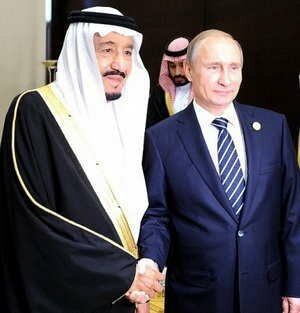 Within the framework of the G-20 summit, V. Putin met with King Salman behind closed doors. Note that within the last 4 months the King Salman's thirty-years old son, Defense Minister of the KSA and second in line to the throne, Mohammed bin Salman has visited Moscow twice, where he met with V. Putin. During these meetings, an agreement was reached on King Salman's visit to Moscow before the end of the year. A packet of agreements is being prepared for the Saudi King's visit on supply of Russian military equipment and weapons worth up to 10 billion US dollars.
Within the framework of the G-20 summit, V. Putin met with King Salman behind closed doors. Note that within the last 4 months the King Salman's thirty-years old son, Defense Minister of the KSA and second in line to the throne, Mohammed bin Salman has visited Moscow twice, where he met with V. Putin. During these meetings, an agreement was reached on King Salman's visit to Moscow before the end of the year. A packet of agreements is being prepared for the Saudi King's visit on supply of Russian military equipment and weapons worth up to 10 billion US dollars.
However, it should be noted that over the past 20 years, the Saudis have repeatedly held talks in Moscow on buying from Russia of large lots of arms, but they were never implemented. These talks had mainly a political subtext, to put pressure on Washington and Tehran. It is possible that the same will happen this time. Besides, the Russian MIC (Military Industrial Complex)'s products are not compatible with the western military equipment that has been supplied to the KSA for decades.
Conducting regular talks in Moscow on the purchase of Russian weapons, the Saudis at the same time lead a price war with the Muscovites in Europe, offering big discounts to Europeans in order to expand the KSA's share in the European oil market. This way, the Saudis are trying to make Moscow restrain its geopolitical ambitions in the zone of Saudia's interests in the Middle East.
It should be noted that Syria also has significant domestic energy resources. Before the civil war of 2011, Syria had been meeting its need in oil and gas from its own fields. (According to the CIA-World-Factbook, as of January 1, 2015, oil reserves in Syria amounted to — 2.5 billion barrels, and gas reserves — 240.7 billion cubic meters). However, as a result of the civil war, the level of oil and gas dropped significantly and is not more 25 % of the pre-war level. Currently the IS controls the major oil fields in the country, mainly in the area of Deir ez-Zor.
According to the US Geological Survey's (USGS) estimates in the eastern Mediterranean (the Levant Basin), there is about 1.7 billion barrels of oil and about 4 trillion cubic meters of natural gas. A substantial portion of these deposits is located on Syria's Mediterranean shelf. In December 2013, the Ministry of Oil and Mineral Resources of Syria signed an agreement with the Russian-Belarusian Soyuzneftegaz Company to conduct exploration work on the Syrian shelf with a total area of over 2 thousand square kilometers.
Supporting B. Assad's regime, Russia is trying at all costs to maintain its presence in Syria, among other things, to avoid laying of the long-planned Qatari gas pipeline through Syria to Europe. As is known, small Qatar is ranked third in the world in terms of gas reserves (25.2 trillion cubic meters), and second after Russia (203.9 billion cubic meters) by gas exports (94.9 billion cubic meters).
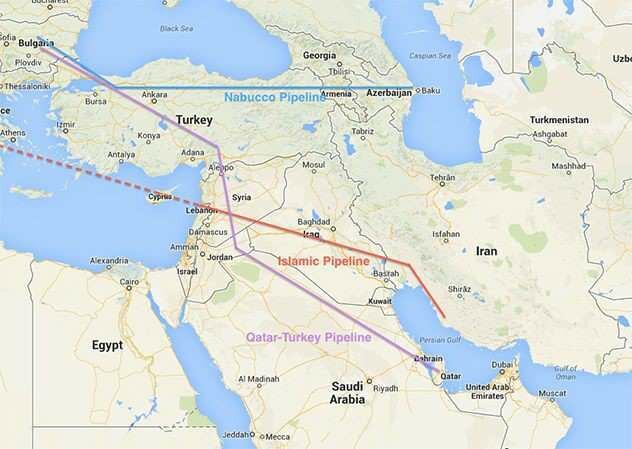 But B. Assad's regime has become a major obstacle on the way to the realization of the project of building a gas pipeline Qatar-Saudi Arabia-Jordan-Syria-Turkey and South and Central Europe, which would allow Qataris to strike at Gazprom by a sharp increase in the supply of cheap Qatari gas to Europe. Thus, Qatar's supporting the Syrian armed opposition is largely due to the fact that Doha has long sought to enter the internal EU gas market and to become a strategic supplier of fuel to European countries that have long wanted to reduce their dependence on Russian gas.
But B. Assad's regime has become a major obstacle on the way to the realization of the project of building a gas pipeline Qatar-Saudi Arabia-Jordan-Syria-Turkey and South and Central Europe, which would allow Qataris to strike at Gazprom by a sharp increase in the supply of cheap Qatari gas to Europe. Thus, Qatar's supporting the Syrian armed opposition is largely due to the fact that Doha has long sought to enter the internal EU gas market and to become a strategic supplier of fuel to European countries that have long wanted to reduce their dependence on Russian gas.
If politically Russia and Iran are B. Assad's allies, in the sphere of energy they can't help competing. Iran's oil reserves (151.2 billion barrels.) are 2.5 times higher than Russian ones (60 billion barrels), and by gas reserves (33.07 trillion cubic meters), Iran ranks second after Russia (47.57 trillion cubic meters). With the recent lifting of international sanctions, Iran also plans to build its oil and gas pipelines through Syria and Turkey to Europe. In November 2012, Iran started construction of its section of the Iran-Iraq-Syria-Europe gas pipeline, which stopped due to the unstable situation in Syria and Iraq. In 2013, it was planned to start construction of the pipeline IGAT-9 through Turkey and on to the southern European countries, but under the influence of sanctions and embargoes, Iran was forced to mothball this construction as well. However, Iran will soon return to its plans of supplying energy carriers to Europe where it will have to press the Russian oil and gas companies.
To be continued…

